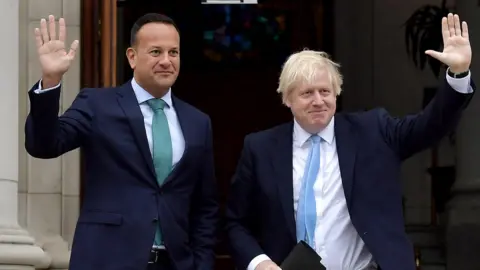Brexit: Johnson's plan for a deal? Amend the backstop

 Getty Images
Getty ImagesAs the greatest showman in Downing Street since his hero Winston Churchill, Boris Johnson knows how to create a drama.
A prison cell is being lined up for the prime minister - if some of the wildest speculation about his Brexit strategy is true.
Keen to stage a "people versus the establishment" confrontation, Mr Johnson would relish the thought of the Balliol One penning the Ballad of Wormwood Scrubs.
The poem would tell the tale of the prime minister who sacrificed his own liberty to deliver on the will of the people, by refusing an extension to the UK's membership of the EU.
But what if Boris Johnson is expending less energy on how to break the law and more on brokering a deal?
Newsnight has spoken to two senior Tories - one from the Remain side and one from the Brexit side - who are convinced the prime minister is genuinely working on a deal. And the two Tories are familiar with his current thinking.
What does Mr Johnson want?
The prime minister has persuaded these MPs that he wants a deal by voicing fears about the impact of a no-deal exit from the EU. In his meeting today with the Irish Taoiseach Leo Varadkar, Mr Johnson said that no deal would amount to a "failure of statecraft for which we would all be responsible".
The prime minister is understood to believe that the immediate impact of no deal on individual areas can be managed. But he is said to have voiced concerns about how long the uncertainty around no-deal could last.
And so the prime minister is interested in a so-called "Canada Plus" free trade agreement with the EU. Theresa May rejected this option because the EU would only ever offer this to Great Britain (England, Scotland and Wales) and not to the United Kingdom as a whole. This is because the EU has insisted that Northern Ireland would have to remain closely aligned to the EU to avoid a hard border.
Theresa May rejected a "Northern Ireland only backstop" in favour of a model that applied more widely to the UK. Northern Ireland would remain strongly within the EU's orbit while Great Britain would be tied closely - though not wholly - to Northern Ireland.
"BRINO," came the charge from the Brexiteers - labelling Mrs May's deal "Brexit in name only".
The Tories familiar with Boris Johnson's thinking say he is now willing to contemplate a version of the so-called "Northern Ireland only backstop". Under this plan Northern Ireland would be closely bound to the EU on areas where there are already elements of an all Ireland economy - agriculture and electricity.
But Great Britain would be free to chart its own course. That would free GB to have a free trade agreement with the EU but would create a border down the Irish Sea. All of that could be achieved by amending the backstop in the Brexit withdrawal agreement to apply only to Northern Ireland. The separate political declaration would be amended to say that a Canada Plus trade deal would be negotiated for Great Britain. The government would be wary of calling the new mechanism a backstop, because it regards the current backstop as anti-democratic.
Downing St confirmed that a backstop in any form is unacceptable to the prime minister. But he is willing to recognise, as he told MPs last week, that "agri-food is increasingly managed on a common basis across the island of Ireland".
The changes are likely to be fiercely resisted by Northern Ireland's Democratic Unionist Party. But at this point my Remain and Brexiteer Tory sources differ.
The Remainer tells me: "Boris Johnson is not a Unionist. So he would think nothing of throwing the DUP under the bus if that was in his interests."
The Brexiteer says Boris Johnson will not abandon the DUP. The MP believes the DUP leader Arlene Foster could sign up to a deal along these lines if three conditions are met:
- The Northern Ireland power sharing executive would have to be re-established and it would have to decide whether to approve the deal. This is because Northern Ireland would have to agree to the deal - it could not be imposed by the UK government.
- The UK government would have to make a series of commitments in legal codicils confirming its commitment to Northern Ireland's place within the UK.
- The areas where Northern Ireland would be closely aligned with the EU would have to apply in areas which are currently or largely run on an all Ireland basis - agriculture and the all Ireland electricity market. Under this plan Northern Ireland would not be fully part of the EU's single market and customs union. Closer alignment with the EU could only evolve over time.
The Brexiteer Tory believes this can all be agreed by 31 October. The Remainer Tory believes the prime minister is sincere in his wish to find a deal. But the MP believes Johnson is failing to understand the immense hurdles that would have to be cleared even if a deal is reached.
